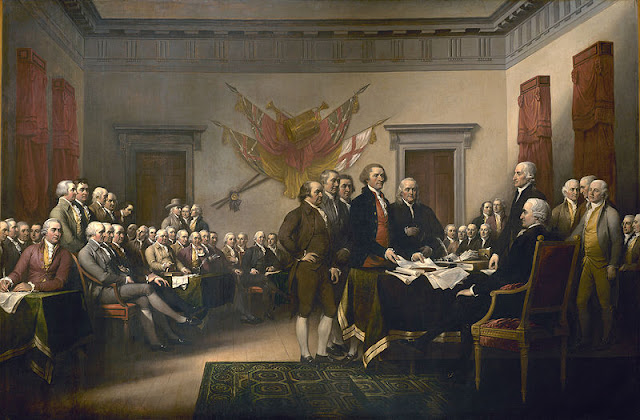Edmund Burke
For this class, we will cover the origins of conservative political philosophy. Conservatism really emerged in the aftermath of the French Revolution (1789-1799). The term conservative was first used to identify the supporters of Edmund Burke (1729-1797) who was known for his writings on the revolution in Reflections on the Revolution in France (1790). Burke was known for criticizing the revolution for moving too fast, and henceforth the term conservative came to identify those who wanted preserve traditions from radical change. In theory, conservatives are not against change, they just prefer a slower pace of change, but in practice that does not always seem to be the case.
The revolution began in 1789, and within a few years had overturned all of French society. It is tough to summarize an event as complicated as this, but basically France had been a monarchy for a long time, and in recent years the power of the monarchy had grown to the point there were very restraints on the power of the king. Besides this, there was a class of people known as aristocrats or nobles, who owned most of the land in France and whose land and honorary titles were passed on through hereditary. At one point, the aristocrats did at least manage local affairs, but over the years many of these powers were taken over by the king's government, so the aristocrats continued to enjoy the privileges their position gave them, without really doing much of anything for the people they were supposed to rule over. At the same time, the living standards of the common people had grown worse, mainly from the excessive taxes the king had put on people in order to fight wars, while most of the aristocrats were exempt. The revolution was a moment of world historical importance as it marked the first time, in modern times, where the common people rose up against the king and aristocrats and were able to take power away from them, and in many regards permanently, as the monarchy was never established again, despite a few attempts at brining it back.
 |
| Execution of Louis XVI, 1793 |
 |
| Edmund Burke |
Two, again, while not denying or rationalizing the violent excesses, it is important to point out that the most violent episodes coincided with both a civil war in France itself resulting from the fall of the monarchy, the displacement of the French nobility, with large sections of the rural peasantry supporting the “old regime,” with a simultaneous foreign war, as literally all of the major kingdoms of Europe united to try to crush the revolution by force. That seems to me to play a greater role in explaining the descent into violence (even cannibalizing their own leadership) more than some sort of inherent violent quality, or even more, divine punishment for the “sins” of the French people. Furthermore, are we really supposed to believe that elites are not violent? After all, the main reason the French state was bankrupt was because of its long history of warfare, including supporting the American revolution against its hated rival the British.
 |
| Siege of Tournai, 1667 |
 |
| Battle of Seneffe, 1674 |
Third, and this has not really been discussed yet, but you also have to consider the ultimate consequences of the revolution. Not only is the legacy of the revolution in 1789 important in itself, but France is generally considered to have a strong history of revolutionary politics, even into the present. For example, there are actually several “French revolutions” in 1848, in 1871 with the Paris Commune, and several other important revolutionary moments, like the general strike in 1968, or the ongoing protests now.
 |
| Communist barricade, 1871 |
 |
| Yellow vest protest on Champs Élysées, 2018 |
At the same time, France has one of the highest standards of living in the world, and I think you can definitely make the argument that this results in large part from the history of revolutionary politics. France has a higher life expectancy than the US, has a healthcare system that is generally considered the best in the world, and much less economically polarized than the US. As the chart below shows, income concentration among the top 10 percent earners is much higher in the US than in France. Ironically, the most important studies on inequality were done by French economists Thomas Piketty and Immanuel Saez.
"Many of our thinkers, instead of exploding general prejudices, use their skill to discover the wisdom that lies hidden in them. If they find what they seek (which they usually do), they think it wiser to continue the prejudice with the reason nested in it than to throw away the coat of prejudice and to leave nothing but the naked reason; because prejudice, with its reason, has a motive to give action to that reason and a feeling that will give it permanence. Prejudice is ready for application in an emergency; it has the mind already engaged in a steady course of wisdom and virtue, and doesn’t leave the man hesitating—sceptical, puzzled, and unresolved—at the moment of decision. Prejudice makes a man’s virtue his habit, and not a series of unconnected acts. Through just prejudice his duty becomes a part of his nature" (p. 49).
"Remarkably, no one draws the most obvious analogy between the countermovements for protection of society in the 1930s and those today. If, in the 1930s, the alternatives to economic liberalism and hyper-globalization were fascism, Stalinism, and some version of Social Democracy, today I submit that they are analogously: right populism, left populism, and varieties of liberal/democratic eco-socialism."
"We can only hope that the first two alternatives fail and, if the relevant movement-parties leaders come to power, that they turn out to be not quite as totalistic and terrible as fascism or Stalinism."
https://prospect.org/power/americans-liberal-even-know/




Comments
Post a Comment